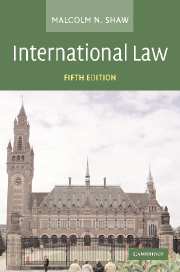Book contents
- Frontmatter
- Contents
- Preface
- Table of cases
- Table of treaties and selected other international instruments
- List of abbreviations
- 1 The nature and development of international law
- 2 International law today
- 3 Sources
- 4 International law and municipal law
- 5 The subjects of international law
- 6 The international protection of human rights
- 7 The regional protection of human rights
- 8 Recognition
- 9 Territory
- 10 Air law and space law
- 11 The law of the sea
- 12 Jurisdiction
- 13 Immunities from jurisdiction
- 14 State responsibility
- 15 International environmental law
- 16 The law of treaties
- 17 State succession
- 18 The settlement of disputes by peaceful means
- 19 Inter-state courts and tribunals
- 20 International law and the use of force by states
- 21 International humanitarian law
- 22 The United Nations
- 23 International institutions
- Some useful international law websites
- Index
- References
1 - The nature and development of international law
- Frontmatter
- Contents
- Preface
- Table of cases
- Table of treaties and selected other international instruments
- List of abbreviations
- 1 The nature and development of international law
- 2 International law today
- 3 Sources
- 4 International law and municipal law
- 5 The subjects of international law
- 6 The international protection of human rights
- 7 The regional protection of human rights
- 8 Recognition
- 9 Territory
- 10 Air law and space law
- 11 The law of the sea
- 12 Jurisdiction
- 13 Immunities from jurisdiction
- 14 State responsibility
- 15 International environmental law
- 16 The law of treaties
- 17 State succession
- 18 The settlement of disputes by peaceful means
- 19 Inter-state courts and tribunals
- 20 International law and the use of force by states
- 21 International humanitarian law
- 22 The United Nations
- 23 International institutions
- Some useful international law websites
- Index
- References
Summary
In the long march of mankind from the cave to the computer a central role has always been played by the idea of law – the idea that order is necessary and chaos inimical to a just and stable existence. Every society, whether it be large or small, powerful or weak, has created for itself a framework of principles within which to develop. What can be done, what cannot be done, permissible acts, forbidden acts, have all been spelt out within the consciousness of that community. Progress, with its inexplicable leaps and bounds, has always been based upon the group as men and women combine to pursue commonly accepted goals, whether these be hunting animals, growing food or simply making money.
Law is that element which binds the members of the community together in their adherence to recognised values and standards. It is both permissive in allowing individuals to establish their own legal relations with rights and duties, as in the creation of contracts, and coercive, as it punishes those who infringe its regulations. Law consists of a series of rules regulating behaviour, and reflecting, to some extent, the ideas and preoccupations of the society within which it functions.
And so it is with what is termed international law, with the important difference that the principal subjects of international law are nation-states, not individual citizens.
- Type
- Chapter
- Information
- International Law , pp. 1 - 41Publisher: Cambridge University PressPrint publication year: 2003

